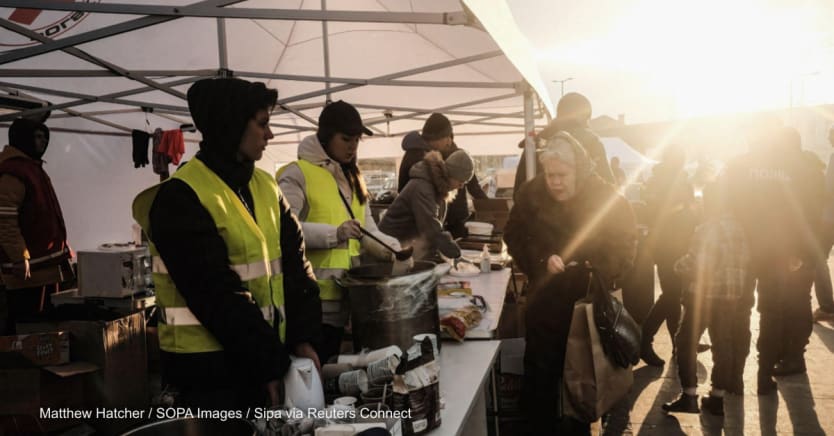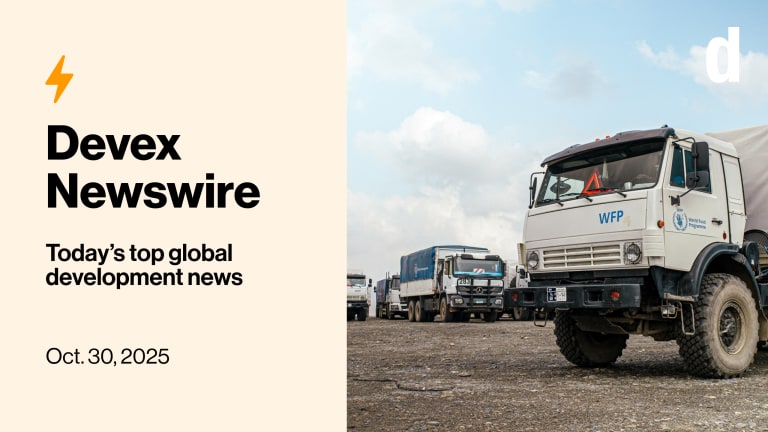
Humanitarian groups are calling for carve-outs to the United Kingdom’s sanctions regime against Russia so that the measures won’t inadvertently hamper their attempts to help civilians affected by the war in Ukraine and other crises around the globe.
There are fears that the sanctions against Russia — imposed by the U.K. and other Western governments in response to its invasion of its neighbor — could severely harm the responses of NGOs by interrupting their work in areas of Ukraine that rely on Russian currency or financial institutions.
NGOs are calling for a legal tool called exceptions to be added to sanctions against Russia, to apply both retroactively and for any forthcoming laws. The United Kingdom’s sanctions impose legal restrictions on dealing with Russian financial institutions, companies, and individuals, while also implementing asset freezes and other punitive measures.
“Aid operations will be immediately impacted by sanctions if appropriate exemptions are not issued.”
— Martin Hartberg, U.K. director, Norwegian Refugee CouncilWording for exceptions already exists and can be easily added to the U.K. government’s sanctions, according Martin Hartberg, director at the Norwegian Refugee Council in the U.K.
“We have a template there from the Afghanistan humanitarian exception that came into force at the end of January and which the FCDO [Foreign, Commonwealth & Development Office] worked really hard to get right,” he said. “We now have the opportunity to act early to avoid any problems down the line that could have devastating consequences for people in Ukraine.”
If securing exceptions fails, the second preference for humanitarian groups is for the government to apply a tool known as a “general licence,” which provides sanctions exemptions for specified activities. This is what allowed Chelsea Football Club to continue operating, albeit in a restricted manner, after U.K. sanctions targeted the club’s Russian billionaire owner, Roman Abramovich, on Thursday.
“Incorporating exceptions into statutory instruments or issuing general licences now, without delay, would help to ‘future-proof' U.K. sanctions to ensure they don’t do any damage to the people they are trying to help,” Hartberg said.
The measures are needed because humanitarian agencies like NRC have previously “faced huge operational challenges when working in areas under the control of sanctioned individuals or groups, when sanctions do not include humanitarian safeguards,” Hartberg said.
Banks have refused to facilitate humanitarian financial transfers for Afghanistan, Syria, and elsewhere, “meaning we often struggle to pay staff, suppliers, or run aid programs,” Hartberg added. “We are concerned this could happen in Ukraine as well.”
UK, Canada, Netherlands announce 'international Ukraine support group'
As the humanitarian crisis in and around Ukraine escalates, three prime ministers say they want to bring the world together to help the people of Ukraine — and counter Russia.
Humanitarian operations in parts of the country’s eastern Donbas region, which have been under pro-Russian control for years, already use the Russian ruble and have bank accounts with institutions linked to Russia.
“These aid operations will be immediately impacted by sanctions if appropriate exemptions are not issued,” Hartberg said.
“Going forward, we may face these types of issues in other parts of Ukraine as well — impacting our ability to help Ukrainians who urgently need assistance,” he added.
It is unclear how the sanctions would affect humanitarian operations if Russia increased its control over Ukrainian cities, which would further complicate the financial landscape.
There are particular concerns about the ability to carry out cash programming, which is regarded by humanitarian workers as a critical emergency response tool.
Beyond Ukraine, Hartberg worried about NGOs working in other areas that use Russian currency and financial institutions, such as the Georgian breakaway regions of South Ossetia and Abkhazia. Even Afghanistan could be affected, as some NGOs use Tajikistan — which has some exposure to the ruble and Russian banking connections — as a support base for their operations in the country, he said.
An assemblage of U.K. government officials, NGOs, and financial institutions called the “trisector group” is understood to be meeting next week to discuss how to avoid the unintended humanitarian consequences of sanctions.
FCDO official Thomas Drew told the U.K. Parliament’s Foreign Affairs Committee on Monday that “in short, yes,” there would be sanctions exemptions for humanitarian agencies but did not give further detail on what this would entail or how long this would take. He described the issue as one of the “tensions” in the government’s work.
Hartberg said there was a need for humanitarian exceptions to be standardized across members of the G-7 group of countries.
“Aid agencies are impacted by the multiple layers of different sanctions imposed by different G-7 members. Therefore, multilateral coordination to avoid negative consequences of aid operations is needed, and the U.K. can play a leading role here,” he said.
Asked if exceptions to sanctions might be exploited by those the measures are intended to target, Hartberg said that “aid agencies have well-established ways of working, robust due diligence procedures, and there are other areas of U.K. law that provides protection against any potential misuse of exceptions — for example, anti-circumvention regulations which NGOs are subject to.”








